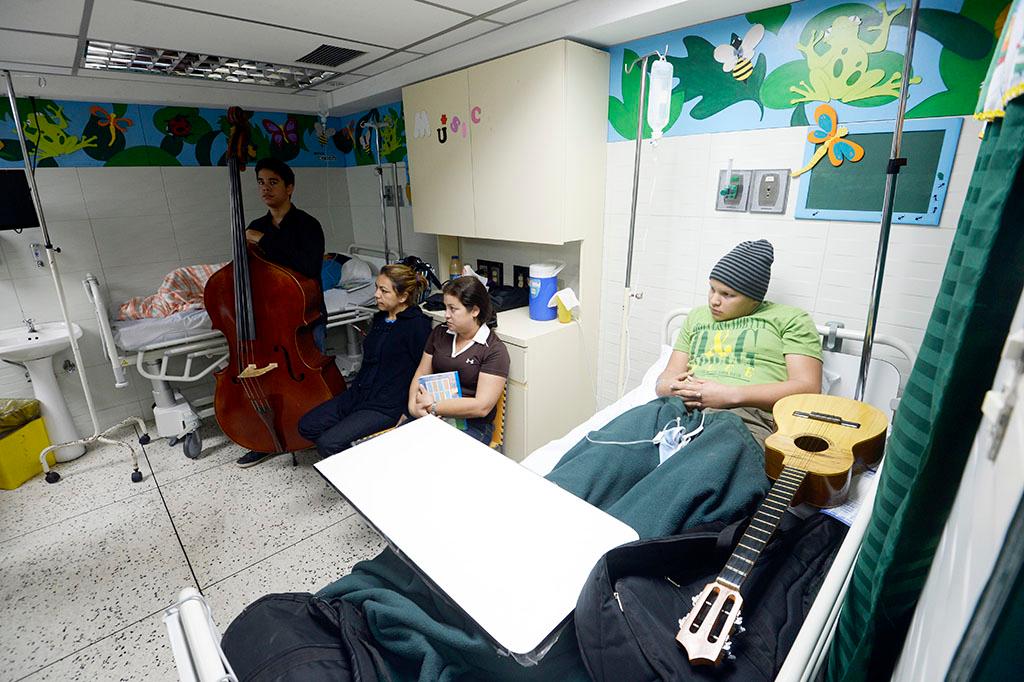Venezuela’s US dollar shortage puts its health sector in intensive care
A child (R) receiving chemotherapy at the oncology yard of the JM de los Rios pediatric hospital in Caracas on Sept. 26, 2013.
While hemophilia sufferer Sergio Tovar lay in agony for five days at a hospital in Venezuela, his friends and family scoured hospitals and pharmacies looking for life-saving drugs.
Eventually a cousin, Jenny Sequeda, helped find a substitute for the protein coagulant Tovar needs for his blood condition.
Almost everywhere they went in the southwestern state of Apure it was the same story: a lack of dollars meant importers had stopped purchasing the medicine.
"Everyone who has hemophilia, their life is at risk," said Sequeda, whose 6-year-old son also suffers from the illness.
He last received supplies of his blood medicine in January, which he has to take two times a week.
Many importers have run up big debts with providers abroad due to red tape and delays acquiring dollars through the state currency agency.
In some cases, they say, credit lines have been frozen and deliveries held up.
The shortage of medicines is part of broader economic turmoil that forces Venezuelans to routinely form hours-long lines outside shops to buy staples such as cooking oil, flour and milk.
Alongside annual inflation of 57 percent, the shortages and queues were a main driver of a wave of opposition-led street protests that broke out around the country early last month.
At least 31 people have been killed.
Companies that import and make medicines and medical items say they now owe their suppliers some $1.2 billion.
"Of every 10 products we request from distributors, we find five or sometimes fewer," said Freddy Ceballos, president of Pharmaceutical Federation of Venezuela.
Shortage of machinery too
Ceballos said President Nicolas Maduro's socialist administration recently vowed to come up with a timetable under which they would get more dollars to his members, but that they had heard nothing more since.
Government officials say they have to examine requests for dollars to stop importers buying dollars at the official rate of 6.3 bolivars — then selling them on the black market for about 10 times that much. That causes delays in dollar disbursements.
The government says a new foreign exchange system known as Sicad 2 will solve the shortages, but it has yet to be launched.
Among the hardest-to-find drugs now are medicines to treat diabetes and hypertension. Others complain of difficulties in finding medication for illnesses affecting the nervous system and cardiovascular illnesses.
Health advocacy groups have warned about the shortages not only of drugs, but also of crucial machinery such as scanners and radiation equipment needed for cancer treatments.
The country imports 60 percent of the medicines it consumes and many of the raw materials for domestic production.
"We're seeing irregular deliveries of important cancer drugs in some parts of the country," said Francisco Valencia, who heads an organization representing patients with serious illnesses.
"Raised from hell"
Venezuela's Association of Private Clinics says least 220 items including drugs and medical equipment are missing from its members' inventories.
Maduro rejects criticism of the health sector, which he says been strengthened a lot during the 15 years since his predecessor and mentor, the late Hugo Chavez, came to power.
"They say the health system is in the gutter," he said last week during a graduation ceremony for 2,500 doctors who will be deployed to work in the some of the country's poorest areas.
"No!" Maduro cried. "It has been lifted up from the hell where Hugo Chavez found it."
When Chavez took office he created a network of clinics in impoverished neighborhoods and isolated rural villages, and brought in tens of thousands of Cuban doctors to staff them.
Also with the help of political allies in Havana, he had thousands of "community medics" trained to expand coverage. The government says that since 1999 the number of doctors has risen to 80 per 100,000 inhabitants, up from 20 per 100,000.
But for thousands of doctors and nurses who gathered in squares across the country last week to protest against the shortages, the government's efforts to improve the situation have only made things worse.
"The health system is in intensive care," said Ana Contreras, head of the Nursing College of Caracas, at the demonstration. "We have supplies for about a month and a half, in the public hospitals as well as in the private sector."
In a sign of the country's political polarization, nearby hundreds of pro-government medical workers marched to celebrate the achievements of Chavez's self-styled revolution.
"Up to now we have not had any problems with supplies, and we continue working perfectly thanks to the Cuba-Venezuela agreement," said Yasmin Lucchi, 23, a medical student wearing a necklace decorated with the image of Chavez's eyes.
Patients such as Margot Guerrero — who recently visited three hospitals in a futile search for drugs to treat stomach and colon polyps — are becoming increasingly desperate.
"I'm not a Chavista, nor one of the opposition," said the 35-year-old at a street protest. "If I had the chance to meet Nicolas Maduro, I would tell him health matters to everyone."
(Reporting by Eyanir Chinea; Writing by Daniel Wallis; Editing by Lisa Shumaker)
Every day, reporters and producers at The World are hard at work bringing you human-centered news from across the globe. But we can’t do it without you. We need your support to ensure we can continue this work for another year.
Make a gift today, and you’ll help us unlock a matching gift of $67,000!
